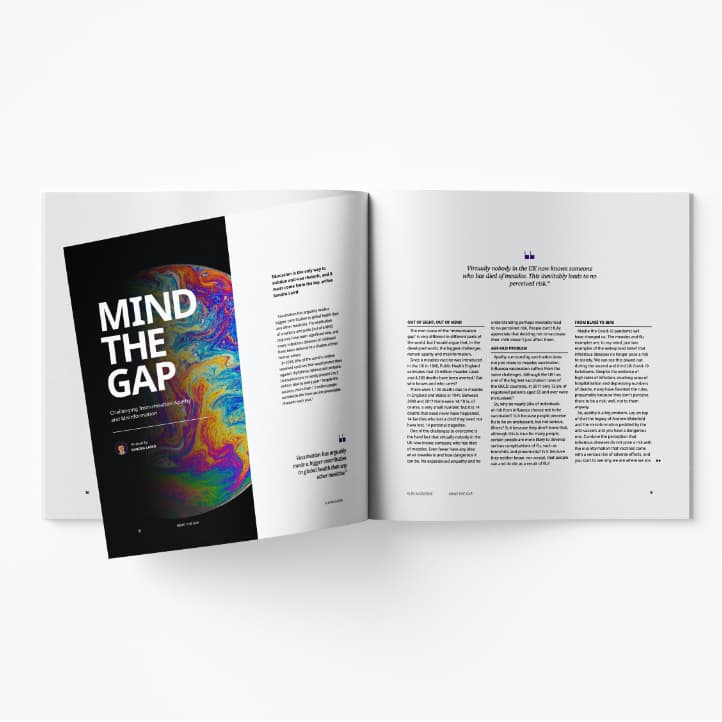
Mind the Gap – Challenging Immunisation Apathy and Misinformation

Vaccination has arguably made a bigger contribution to global health than any other medicine. The eradication of smallpox and polio (in four of six WHO regions) have been significant wins, and many infectious diseases of childhood have been reduced to a shadow of their former selves.
In 2019, 85% of the world’s children received vaccines that would protect them against diphtheria, tetanus and pertussis. Immunisations currently prevent 2 to 3 million deaths every year.1 Despite this success, more than 1.5 million people worldwide die from vaccine-preventable diseases each year.
Out of sight, out of mind
The root case of the ‘immunisation gap’ differs greatly around the world, but I would argue that, in the developed world, the biggest challenges remain apathy and misinformation. Since a measles vaccine was introduced in the UK in 1968, Public Health England estimates that 20 million measles cases and 4,500 deaths have been averted.3 But who knows and who cares? There were 1,145 deaths due to measles in England and Wales in 1941. Between 2000 and 2017 there were 14.4
It is, of course, a very small number; but it is 14 deaths that need never have happened, 14 families who lost a child they need not have lost, 14 personal tragedies. One of the challenges to overcome is the hard fact that virtually nobody in the UK now knows someone who has died of measles. Even fewer have any idea what measles is and how dangerous it can be. No experienced empathy and no understanding perhaps inevitably lead to no perceived risk. People don’t fully appreciate that deciding not to vaccinate their child doesn’t just affect them.
Virtually nobody in the UK now knows someone who has died of measles. This inevitably leads to no perceived risk.
Age-old problem
Apathy surrounding vaccination does not just relate to measles vaccination. Influenza vaccination suffers from the same challenges. Although the UK has one of the highest vaccination rates of the OECD countries, in 2017 only 72.6% of registered patients aged 65 and over were immunised.5
So, why do nearly 30% of individuals at risk from influenza choose not to be vaccinated? Is it because people perceive flu to be an unpleasant, but not serious, illness? Is it because they don’t know that, although this is true for many people, certain people are more likely to develop serious complications of flu, such as bronchitis and pneumonia? Is it because they neither know, nor accept, that people can and do die as a result of flu?
From blasé to bias
Maybe the Covid-19 pandemic will have changed us. The measles and flu examples are, to my mind, just two examples of the widespread belief that infectious diseases no longer pose a risk to society. We can see this played out during the second and third UK Covid-19 lockdowns.
Despite the evidence of high rates of infection, crushing rates of hospitalisation and depressing numbers of deaths, many have flaunted the rules, presumably because they don’t perceive there to be a risk; well, not to them anyway. So, apathy is a big problem. Lay on top of that the legacy of Andrew Wakefield and the misinformation peddled by the anti-vaxxers, and you have a dangerous mix. Combine the perception that infectious diseases do not pose a risk with the misinformation that vaccines come with a serious risk of adverse effects, and you start to see why we are where we are.
Apathy is a big problem. Lay on top of that misinformation pedalled by the anti-vaxxers and you have a dangerous mix.
Vaccine counter-culture
So, what should we do? There is, without doubt, a pressing public health need to educate the UK population on the risks posed by infectious disease. We need to calculate and communicate the number of lives saved by every single vaccine we use. We need to ensure that everyone knows that they have a role to play, that they have a responsibility to society as well as themselves and their families. That will help to establish the need for vaccination. My 12-year-old twin boys recently received their first dose of HPV vaccine. There was much discussion amongst the school mums about whether to vaccinate their boys. Some were asking why boys were being vaccinated at all, some were debating whether it was “worth it” and one even shared a WhatsApp message saying “I’ve heard they cause infertility in boys”. Needless to say, I put them right. It shouldn’t be like this. We can’t assume that people know why particular vaccines are on the national immunisation schedule, because quite clearly they don’t.
More needs to be done to address both the absence of information and the existence of misinformation. We also need to ensure that every single person knows about the robust process of vaccine development. This is not just the responsibility of pharmaceutical companies. Sadly, too many people are suspicious that the industry is responsible for misinformation or think that every piece of communication is designed to hoodwink us.
1. https://www.who.int/en/news-room/fact-sheets/detail/immunization-coverage
2. https://www.who.int/mediacentre/commentaries/vaccine-preventable-diseases/en/
3.https://vk.ovg.ox.ac.uk/vk/measles#:~:text=Since%20a%20measles%20vaccine%20was,been%20averted%20in%20the%20UK
4. https://www.gov.uk/government/publications/measles-deaths-by-age-group-from-1980-to-2013-ons-data/measles-notifications-and-deaths-in-england-and-wales-1940-to-2013
5. https://www.nuffieldtrust.org.uk/resource/adult-flu-vaccination-coverage#:~:text=In%20England%2C%20flu%20vaccine%20uptake,70.5%25%20in%202016%2D17






